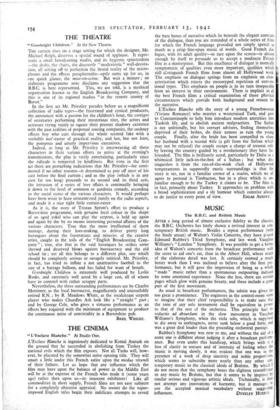MUSIC
The B.B.C. and British Music
AFTER a long period of almost exclusive fidelity to the classics, the B.B.C. Orchestra has lately shown a revived interest in con- temporary British music. Besides a repeat performance (with the finale uncut) of Walton's Violin Concerto, they have Payed Edmund Rubbra's Third Symphony, and last week Vaughan Williams's " London " Symphony. It was possible to get a better idea of Walton's concerto from the broadcast performance with the score to aid one's ear, than in the Albert Hall, where much of the elaborate detail was lost. It certainly seemed- much better work than I was inclined to believe after the rst per- formance, but it still gave the impression of being as a whole " made " music rather than a spontaneous outpouring induced by some emotional 'experience. None the less, there are certain pages which glow with genuine beauty, and these include a great part of the first movement.
As usual in broadcast performances, the soloist was given fat too great a prominence. The engineers in the control-room seem to imagine that their chief responsibility is to make sure that the tone of any solo instrument shall be equivalent in power to that of the rest of the orchestra. This principle had its reductio ad absurdum in the slow movement in Vaughan Williams's Symphony, when the viola solo, which is supposed to die away to nothingness, never sank below a good forte, and was a great deal louder than the preceding orchestral passage.
Rubbra's Symphony was new to me, and without the aid of a score one is diffident about judging it after a broadcast perform- ance. But even under this handicap, which brings with it a loss of clarity in texture and of 'intensity of feeling when the Music is moving slowly, it was evident that one was in the presence of a work of deep sincerity and noble proportions, which seems to subscribe more nearly than any other con- temporary music to the classical ideals of Brahms. By which I do not mean that the symphony bears the slightest resemblance to any music by Brahms, but that it seems to be inspired by similar serious and vigorous artistic ideals. Technically, it does not attempt any innovations of harmony, but it manages to use the accepted musical vocabulary without suggesting


























 Previous page
Previous page